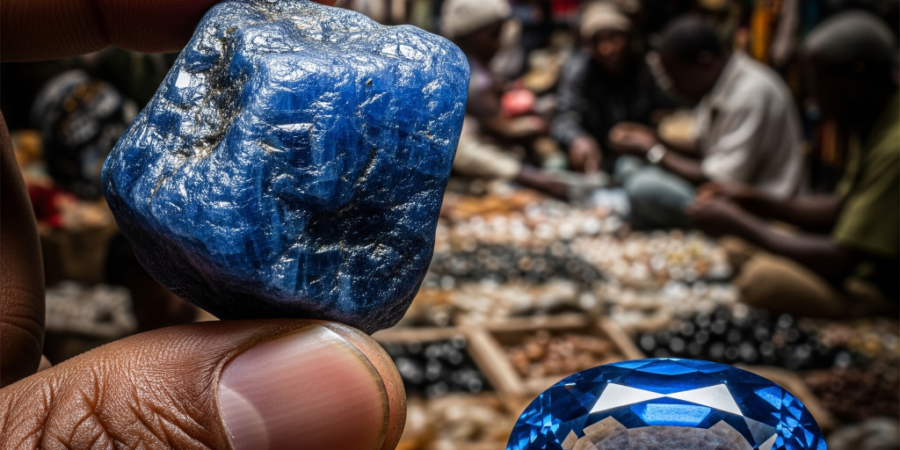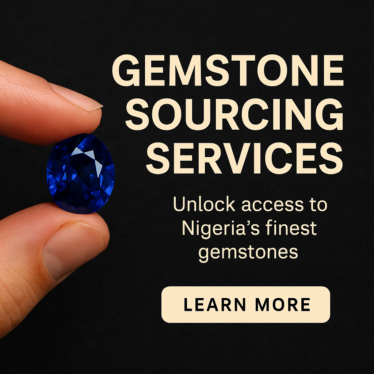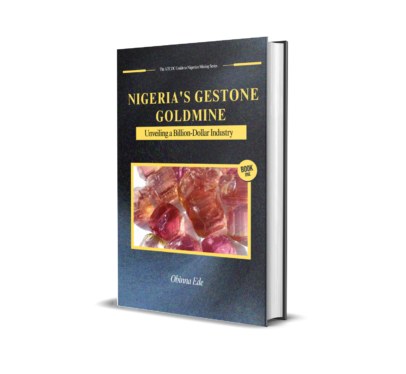1. Introduction: Unveiling Nigeria’s Gemstone Goldmine
Nigeria stands as a paradox in the global mineral landscape: a nation with immense, largely untapped geological wealth that has yet to translate into significant economic benefit. Beneath its soil lies a veritable “gemstone paradise,” endowed with a stunning variety of precious and semi-precious stones. This natural endowment includes prized minerals such as tourmaline, sapphire, emerald, aquamarine, garnet, and topaz, among others. The commercial value of these solid minerals is estimated to be in the “hundreds of trillions of dollars,” with a vast concentration, approximately 70%, located in the northern regions of the country.
Despite this sparkling potential, Nigeria’s solid minerals sector contributes a meager 0.3% to 0.63% to the national Gross Domestic Product (GDP), a figure that has seen only marginal improvement in recent years. This stark disparity between geological reality and economic contribution is a consequence of a profound systemic inefficiency within the country’s mining sector in general, and gemstone value chain in particular. The industry currently operates almost exclusively in its initial stages: rudimentary artisanal mining and the subsequent dealing of rough stones. The more lucrative, value-added processes, such as cutting, polishing, and certification, are largely absent within the country and are instead carried out in established international hubs like Thailand and Hong Kong. The result is a significant leakage of value, as an estimated $3 billion worth of gems is unofficially exported annually, bypassing formal channels and robbing the nation of substantial revenue.
This guide is for the serious international buyer- the jeweler, the designer, the collector, the investor- who recognizes the promise of Nigerian gemstones but is acutely aware of the risks inherent in a fragmented and informal market. It is a roadmap for navigating this complex terrain, providing a transparent and reliable pathway to a supply chain built on authenticity, fairness, and ethical practices. By understanding the challenges and leveraging a network that bridges the gap between the source and the market, it becomes possible to unlock this potential, ensuring both commercial success and a positive impact on the local communities.
2. The State of the Nigerian Gemstone Industry: A Tapestry of Promise and Peril
2.1 The Artisanal Landscape: The Unstructured Foundation
At its core, the Nigerian gemstone industry is a network of small-scale, informal operations. The vast majority of mining is conducted by artisanal miners, often rural farmers who use crude hand tools to extract minerals from weathered bedrock and associated alluvial deposits. This is not an industrial, large-scale endeavor but a labor-intensive, grassroots one. For these miners, the primary motivation is immediate, cash-based income. They are driven by economic necessity, and their focus is on quickly converting their raw finds into cash, which they then sell to intermediaries.
The foundation of this system is inherently unstable and lacks institutional support. Artisanal miners operate with a severe shortage of organized prospecting, a lack of modern infrastructure, and limited access to financing. This is the central friction point in the Nigerian gemstone trade: the local economic model, built on quick transactions and survival, is fundamentally at odds with the demands of a modern, professional international market that requires long-term consistency, transparency, and documented ethical practices.
2.2 The Unregulated Supply Chain: Where Trust is Lost
The journey of a Nigerian gemstone from the ground to the global market is typically a multi-stage process fraught with opacity. After extraction, the rough stones are passed through a series of middlemen and dealers, each taking a cut and adding to the murkiness of the stone’s provenance. In this cash-based ecosystem, record-keeping is virtually non-existent, making it nearly impossible for a foreign buyer to trace a stone’s origin or verify its quality and ethical status with any certainty.
This disorganized and unregulated trade has significant financial consequences. It is a major reason why Nigeria loses billions in potential revenue, as most exports are unofficial and do not contribute to the formal economy. For the buyer, this chaotic environment translates to substantial risk: inconsistent supply, inconsistent quality, and the ever-present threat of fraud or misrepresentation. Without a reliable framework for authentication and ethical validation, building a secure and sustainable sourcing channel becomes a formidable challenge.
3. The Journey from Mine to Market: Our Ethical and Reliable Bridge
Our business model is designed to navigate the complexities of Nigeria’s informal gemstone market by creating a formalized, transparent, and de-risked supply chain. Our strategy is not to reform the entire informal sector, but to establish a trusted parallel system that provides a reliable channel for international buyers. We achieve this by inserting ourselves at the earliest possible point in the value chain and building relationships directly with miners and their communities.
3.1 From the Earth to Our Hands: A Transparent Path
Our core competitive advantage is our on-the-ground presence and direct-to-miner relationships. We bypass the chaotic network of middlemen, ensuring that a greater share of the profit reaches the people who do the hard work of mining. This direct approach fosters a symbiotic relationship: we provide miners with a stable market and fair prices, and in return, we gain direct, ethical access to rough material. Our role is to reconcile the local economic reality with the global market’s demand for transparency. By providing a consistent and fair financial lifeline, we give miners the stability they need, which in turn allows us to secure a verifiable, traceable supply.
The table below illustrates this strategic approach by contrasting the risks of the informal market with the solutions we provide at each stage of the supply chain.
Table 1: The Ethical Supply Chain: Our Value-Add at a Glance
| Supply Chain Stage | The Informal Market Reality | Our Solution |
| Mining | Primarily artisanal miners using rudimentary tools; focused on quick cash sales; lacks organization and funding. | Direct, long-term relationships with miners; provides fair prices and on-the-ground support to bypass middlemen. |
| Local Trade | A fragmented, cash-based network of middlemen leads to revenue loss and no record of production. | Centralized sourcing network; formal, transparent transactions that create a verifiable paper trail and support local communities. |
| Authentication & Grading | No national certification lab; most stones are shipped abroad for grading, leading to lost value and a high risk of fraud. | Facilitates third-party lab reports on demand from credible institutions like GIN and GIA. |
| Value Addition | Most gems are exported as rough; no local lapidary services, so value is captured by foreign processors. | Offers in-country lapidary and custom cutting services to transform rough gems into market-ready products, capturing and retaining value. |
| International Export | Large percentage of gems are unofficially smuggled out; no formal documentation or regulatory compliance. | Manages all official export documentation and compliance procedures, ensuring a secure and legal pathway to the buyer. |
3.2 The Cornerstone of Quality: Authentication and Certification
A significant challenge for the Nigerian gemstone industry is the absence of an internationally acknowledged national laboratory for gemological certification, a gap that costs the country billions of dollars in lost value. This lack of a central authority means that buyers must rely on third parties, which is why trust and transparency are paramount.
We address this issue head-on. Our process provides an initial layer of assurance through our own certificates of authenticity, which detail the stone’s origin and characteristics. For high-value transactions, we facilitate third-party certification from internationally recognized laboratories like the Gemological Institute of America (GIA) or the Gemological Institute of Nigeria (GIN), which offers laboratory services for testing, grading, and quality assurance. This service provides the backbone of the jewelry industry by offering an unbiased, independent report that validates the stone’s quality, species, and any treatments it may have undergone. A certified report gives the buyer the confidence they need to purchase with peace of mind.
3.3 The Cutting Edge: Lapidary Services and Value Addition
Nigeria’s gemstone industry is primarily a producer of rough stones. This means that the skilled labor and capital required for cutting and polishing processes that drastically increase a gemstone’s value are overwhelmingly located outside the country. We close this gap by offering comprehensive lapidary and custom cutting services, through third party partnerships with gems cutters in Nigeria. Our expert lapidaries can transform a raw, uncut mineral into a polished, high-value gem ready for jewelry setting. This not only enhances the value of the stone but also ensures that the benefits of the entire supply chain are retained, a direct counter to the market inefficiencies that plague the industry.
By providing this service, we empower clients with the ability to turn a raw material into a bespoke piece that meets their precise specifications, from faceting a rough gem to repairing or re-polishing a damaged stone. This is an essential part of our promise to deliver not just stones, but solutions that add tangible value.
4. A Guide to Nigeria’s Gemstone Treasures: Key Types, Locations, and Market Insights
4.1 Mapping the Mineral-Rich States: A Geographical Guide
Nigeria’s gemstone deposits are geographically dispersed, with different states known for specific minerals. For a buyer seeking a variety of stones, this fragmentation presents a significant logistical challenge. The need to establish relationships with multiple, unverified sellers across different states exposes a buyer to a higher degree of risk. Our national network of suppliers and our centralized business model provide a single, trusted point of contact, eliminating this logistical and ethical burden.
The following table provides a clear overview of the key gemstone-producing regions in Nigeria.
Table 2: Key Gemstones and Their Mining Locations in Nigeria
| Gemstone Type | Primary Producing State(s) | Key Localities |
| Tourmaline | Nasarawa, Oyo, Plateau, Ekiti | Keffi, Shaki, Ijero Ekiti, Mangu |
| Aquamarine | Oyo, Kaduna, Osun, Bauchi | Shaki, Jemaa, Egbedore, Toro |
| Sapphire | Taraba, Kaduna, Oyo, Borno | Mambilla Plateau (Gembu), Jemaa (Antah), Itesiwaju, Biu |
| Garnet | Oyo, Kogi, Plateau, Zamfara | Komu, Yagba East, Kanke, Tsafe |
| Emerald | Nasarawa, Kaduna, Plateau | Keffi, Gwantu Hills, Jos |
| Amethyst | Kano, Kaduna, Oyo, Nasarawa | Bebeji, Zaria, Atisbo, Keffi |
| Topaz | Bauchi, Nasarawa, Oyo, Plateau | Toro, Kokona, Atisbo, Jos |
| Diamond | Kaduna, Katsina, Sokoto | Birnin Gwari, Kafur, Galewa |
| Spinel | Kaduna | Jemaa (Gidan Waya) |
4.2 Deep Dive into Key Gemstones of Nigeria
Nigeria’s geological bounty is defined by a select group of commercially significant gemstones, each with unique characteristics and value.
- Tourmaline: Perhaps Nigeria’s most famous export, tourmaline is celebrated for its stunning color spectrum. From intense reds and rubellites to deep greens and bi-colored varieties, Nigerian tourmalines are highly prized worldwide. The most sought-after variety is the rare Paraiba-like blue tourmaline, which commands some of the highest prices in the market. Tourmaline rough from locations like Calabar and Ijero Ekiti is known for its high quality and clarity.
- Sapphire: The Nigerian gemstone market truly came into its own with the discovery of the vibrant blue sapphire from the Mambilla Plateau in Taraba State. These sapphires, along with the “denim blue” varieties from Kaduna State, are gaining international recognition for their rich color. Prices for cut sapphires from Nigeria can range significantly, with some teal sapphires valued at over $3,000 per carat.
- Garnet: Nigeria is home to a rich variety of garnets, notably the Rhodolite and Spessartite types. The spessartine garnet, often described as having a fiery “Fanta” color, is particularly coveted. Pricing for these garnets can range from $12 to $16 per gram for red garnet and around $15 per gram for spessartite garnet.
- Emerald: Nigerian emeralds, especially those from the Jos Plateau and Gwantu Hills in Kaduna, are known for their lush green hue and clarity. While not as deeply colored as their Zambian counterparts, they are still considered high-quality gems.
4.3 Understanding Gemstone Pricing and Valuation
Valuation in the Nigerian gemstone market is complex, influenced by a combination of the stone’s physical properties and the intricacies of the supply chain. Since a national certification laboratory is lacking, professional buyers must rely on their own expertise or that of a trusted partner to determine a stone’s true value. The value of a gem is not static; it is a function of its carat weight, color, clarity, and the presence or absence of treatments.
5. Navigating the Business of Gemstones: Trade, Logistics, and Our Solution
5.1 Formalizing the Trade: Legal and Regulatory Pathways
The professional trade of gemstones in Nigeria requires adherence to official procedures that stand in sharp contrast to the informal market. To legally export minerals, a business must be incorporated with the Corporate Affairs Commission (CAC), register as an exporter with the Nigerian Export Promotion Council (NEPC). After incorporation and obtaining the NEPC Permit, the exporter must head to the Ministry of Solid Minerals Development to obtain Permit to Purchase and Possess Minerals, and Permit to Export Minerals for Commercial Purposes; and then pay the Royalty fee for the gems being exported. Other key export documents essential for compliance include the Nigeria Export Proceed form (NXP), a Commercial Invoice, and a Certificate of Origin issued by the National Association of Chambers of Commerce, Industry, Mines, and Agriculture (NACCIMA).
These documents are crucial for formalizing a business and ensuring that goods conform to international quality and weight standards. They also provide a legal and transparent paper trail that is necessary for importing countries, such as the United States, where commercial imports above $2,500 require a formal entry and customs bond. Our services simplify this complex regulatory environment by managing all necessary documentation and logistics, ensuring a smooth and secure transaction from Nigeria to the final destination.
5.2 Building Networks and Mitigating Risk
Navigating the Nigerian gemstone market also involves building a network of trusted partners. Organizations such as the Gemstones Miners & Marketers Association of Nigeria (GMMAN) play a vital role in developing the industry by connecting members to buyers and providing resources on the sector. Industry events like the Nigeria Gemstones and Jewelry Expo are essential for networking and direct access to both local and international traders.
We leverage these networks and our decades of on-the-ground experience to mitigate risk for our clients. By acting as a single, verified entity, we remove the need for a buyer to navigate a fragmented market filled with unverified sellers. This centralization of sourcing is a direct response to the market’s inherent disorganization, turning what would be a risky and logistically complex venture into a single, reliable partnership.
5.3 Your Gateway to Nigeria’s Gemstone Market: A Final Call to Action
The Nigerian gemstone market is at a pivotal point, offering immense opportunities for those who can navigate its complexities. The country’s vast mineral wealth is undeniable, yet its potential remains largely untapped due to the informal nature of its mining and trade. This report has laid bare the challenges, the lack of formal infrastructure, the risk of fraud, and the systemic leakage of value, and presented a clear pathway to overcoming them.
This is where we come in.
We at the Nigerian Mineral Exchange are the definitive bridge between Nigeria’s gemstone potential and the international market’s demand for reliability, authenticity, and ethical practice. By providing a secure, transparent, and value-added supply chain, we offer a solution to every challenge outlined in this guide.
Do not allow the complexities of the informal market to deter you from the wealth of Nigeria’s gemstone treasures. Instead, leverage our insider knowledge, extensive network, our direct-to-miner relationships, and our commitment to ethical sourcing to build a supply chain you can trust.
Contact our expert team today to consult on your gemstone sourcing needs in Nigeria and take the first step toward a secure and ethical partnership.
Contact Us: CALL/ WHATSAPP: +2348130799304 | Email: nigeriamineralexchange@gmail.com | Website: www.nigerianmineralexchange.com
For a deeper dive into the economics and future of this remarkable industry, download our definitive ebook: Nigeria’s Gemstone Goldmine: Unveiling a Billion-Dollar Industry.
READ ALSO:
The Ultimate Guide to Starting a Mining Company in Nigeria
READ ALSO:







Leave a Reply